Great riches can be found by leaving one’s own comfort zone. Sometimes they come in the form of new discoveries we love, other times in an affirmation that we were already where we wanted to be. John Company: Second Edition is pretty far outside my normal area of interest, in fact it might be in the very centre of a Venn diagram of things I don’t like in games: I don’t like politics and negotiation, already got enough of that in my day job. I’m not a historical/war gamer and playing something in a setting full of human suffering fills me with trepidation of whether or not things will be unjustly glorified or over-abstracted. I also neither enjoyed Root nor Pax Pamir Second Edition, both of which I recognise are remarkable designs but I didn’t find a way to get into. So you might be wondering why I decided to buy a copy of JC2E and the embarrassing answer is: nice metal coins! I’m joking of course, but I’m afraid only partially.
I had heard about the game on a number of podcasts and it left a big question mark as I couldn’t grasp what the playing experience is really about. That got me curious. Did the hosts fail to get the point across or was this something I just couldn’t relate to? Another factor was that I kept getting reminded of how many people adore Pax Pamir Second Edition and I always thought maybe I should try it solo a couple of times so it isn’t as jarring for me when I play with other people. In comes a new game by the same author, so why not try that instead. And yes, in the end it were the metal coins that tipped the scale. I was looking for some nice ones and only by chance found someone selling their brand new copy of JC2E including coins for a very fair price. So I thought: worse comes to worse, I can always sell the game and keep the coins. Well, that one went different than I thought!

I’ve noticed that JC2E has a remarkable tendency of finding its way back to my table just after I packed it away. I’ve started reading one book on the East India Company and another one is on its way. I have so many questions of “why did this happen” and “why is it this way in the game” that I wish I could sit down with Cole Wehrle and pick his brain today instead of having to read multiple hundred pages of history books. So if you were thinking a game about ambitious/scheming/corrupt/ruthless/influential/cunning/… entrepreneurs (which attribute applies to what extend depends on which actor one is talking about) in a gruelling time of much blood shed is not for you, you might want to keep on reading…
Theme & Settings
It’s so rare that a game deserves stepping away from its mechanisms and first focus on the theme, but it seems more than apt in this case. Unfortunately, I don’t know nearly enough to do this justice. I’m not a historian and only have only started reading into the topic but it’s absolutely fascinating. I can only encourage you to read into some book excerpts and I dare you to not get hooked as well. So let me try to paint with broad strokes and hopefully I won’t get too much wrong.
The East India Company (EIC) is a dark but fascinating part of human history, the extend of which I didn’t realise before reading up on it. I had known of the British rule over India, but not that it was the result of the century long involvement and ultimately failing of a private company. To me, company sounds like a euphemism in this case: It had a private army that at one point was twice the size of the British army, it “invested” so much into British politics that it caused what William Dalrymple’s book The Anarchy calls “the world’s first corporate lobbying scandal”, its demise led to dozens of banks going bankrupt. One quote I read called it “an empire within an empire” which sounds more to the truth than “company”.
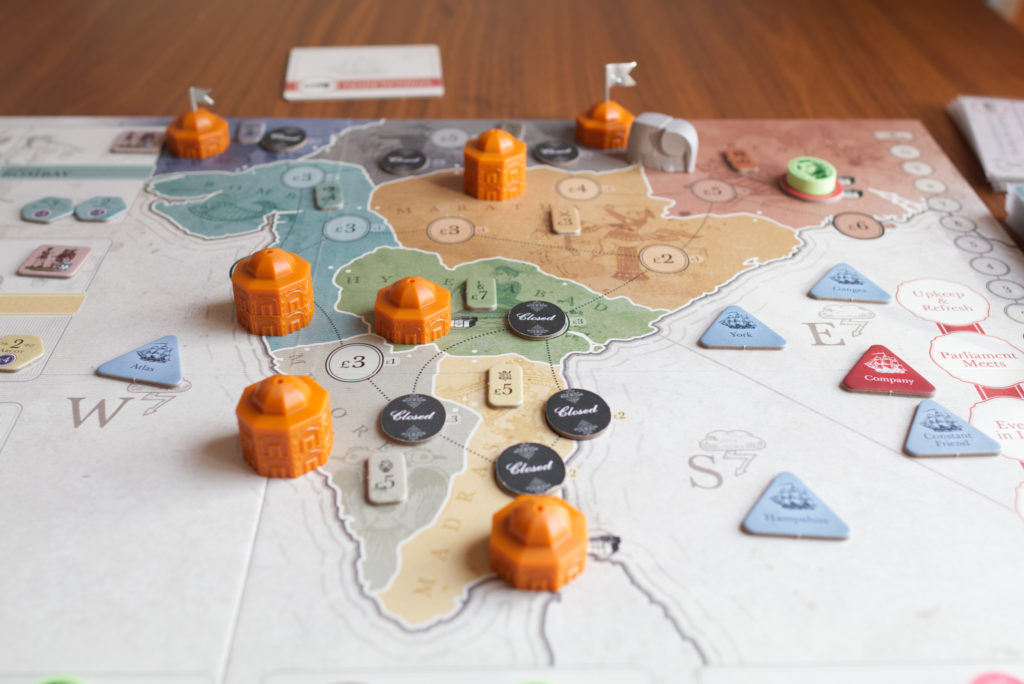
The other main protagonist is India itself. At the time the EIC started operating, things were quite different than you might (at least I had) imagine. Britain was far from its later role in world history and the Dutch, Spanish and Portuguese were already ahead when it came to trading in the area. In 1608, India itself was responsible for a quarter of global manufacturing where Britain “was producing just under 3 per cent of the world’s manufactured goods” (Dalrymple’s book). So when the EIC wanted to go into negotiations with the Mughal Emperor, there was little incentive for him to do so except for a mild curiosity of the what must have looked to him – let’s call it strange to avoid savage – culture of the foreigners.
I’ll stop here as I’m feeling uncomfortable speaking about cultures and histories I know way too little off. Let’s just summarise it as a giant series of fascinating questions starting with “how?”. How was the EIC able to get into its later position? Why the EIC and not the VOC (=Dutch)? Why did the EIC fail and had to be bailed out by the British crown? Why would anyone in India be interested in trading with them at all? At what point did a trading company turn to a violent endeavour?
John Company: Second Edition is here less of an answer and more of a reason to ask these questions. The game board gives us a bird’s-eye view into the EIC with tracks for company standing, debt and available funds as well areas to represent the various offices in the company like Presidency of Bengal or Commander of the Army of Madras. A third of the board is given to a map of India containing various trade routes and with orange tower miniatures used to represent opposition strength. All the aspects of fighting and all the suffering are thankfully (I’ll come to that later) abstracted away.
Each player acts as a family that tries to bring their members into positions to profit from the EIC and ideally get enough money out of it to buy a nice residency (understatement of the month) when the time comes for retirement… which happens a lot faster than you might think. The struggles and interconnectedness of offices within the company make any position difficult to hold on to for long, such that early retirement – or death – are all too common. And if that’s not a problem, there is always politics! One player occupies the role of Prime Minister whose duty it is to propose new laws and get the necessary votes to implement them. These can have a drastic effect on the game like suddenly rendering whole mechanisms inert or present new sources of income.
Setup
Luckily, John Company: Second Edition is an excellent production, otherwise setup might have been a drag. The compact box contains two trays for frequently used components and an additional one that can be left in the box for all components that are only required during setup. Most of setup happens on the main board. There are three different scenarios in the game (not counting the longer 1710 version) and each comes with a single card showing the starting elements like which region of India has what strength or which trading orders have to be blocked off. It also indicates how much debt, standing, army resources and similar the company starts with. Besides the common setup part, there is also a small deck of setup cards that is equally divided between players and shows which starting offices and resources each player has. The cards contain a combination of stock, offices, shipyards, money and other things which produces a different, asymmetric start every game.
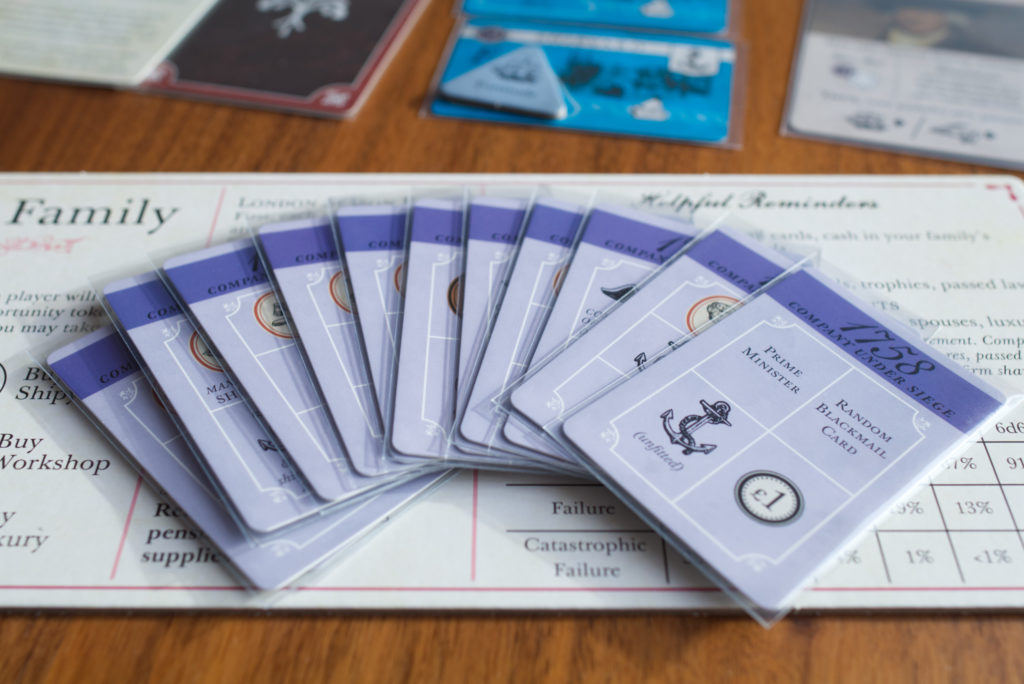
The first scenario 1710 represents an EIC that is just starting out, basically a clean slate. There is no debt, average company standing, a number of possibly lucrative trading routes and not too much opposition. In 1758, the players face a different company. There is much more at stake from the get go, with players getting trophies (reputation for won battles), workshops and the like that can be lost if not careful. India also looks different with more oppositional forces in general and one of the three presidencies effectively blocked off on the map. 1813 offers yet another situation, with multiple laws already in effect, trade with China already established and players forming private firms. I hadn’t had the chance to play this yet because I spent a lot of plays in 1710 but will add updates to this post once I have.
Besides their family members (nice wooden tokens with screen printed individual portraits), each player gets a board that mostly acts as a rules summary but also contains an area to select an action taken at the beginning of a round.
The Turn
Depending on the scenario, JC2E is played over 4-5 rounds (8 for the extended 1710 scenario) with 17 (!) phases in each round. This might seem daunting at first but actually plays surprisingly smoothly if at least one player already knows the rules. It is further helped by the design of the main board where the flow of the round literally follows a red ribbon.
A round starts off with what must be my favourite part: attrition. Each player must role a d6 for each of their office holders and on a 5 or 6, they retire. On a 3 or 4, they get stressed and a cube is placed on them which adds a +1 during the next attrition phase. Retiring is bad in that you’ll lose the power of that office, but it is also the best opportunity to get VP as you invest your personal money to send your family member off to a luxurious residency (the biggest source of victory points). If a player manages to retire someone, they are allowed to pick a card from a limited market of prestige and blackmail cards. The former give substantial power (e.g. 3 additional votes, cheaper to buy stocks) or a spouse which gives VP and reduces the prices of residencies but severely limits one in some way or the other such as no longer be able to buy stocks.
Then each player can pick a family action: hire new writers (basically candidates for office), enlist officers (candidates for becoming commander), purchase luxury, shipyard, workshops or seek to buy shares (one cannot just buy them, the company must have debt to issue them). This takes no time at all and always leaves the wish that one could do at least three or more of them. If one does pick the same action one did in a previous round, one is allowed to do it twice.
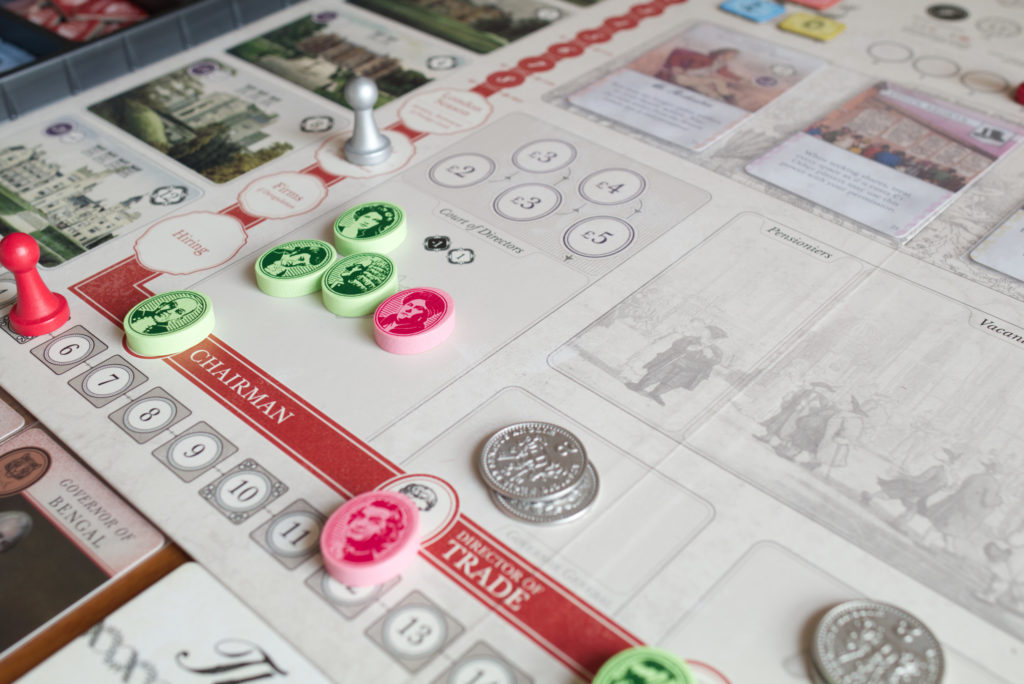
Next (if playing without firms) is hiring where any vacant office position is filled. Each office has its own way of picking a successor. The chairman is elected by the majority of shareholders, the Director of Trade is picked by the Chairman from the current set of office holders, Presidents are picked from the pool of writers in their presidency and so on. This gives a good deal of power to whoever is in the position to make the decision and players can and will bargain a deal to be the one that is picked. One fun rule is the nepotism rule: a player can only elect a member of one’s own family if all other potential candidates agree. Again, something to be bargained about. To help the negotiations, each player has the same set of Promise Cards which can be added as an incentive. One for example is “the player will give the holder of this card 2 pound” which doesn’t sound that tremendous, until one realises there is no restriction to WHEN that can be redeemed. It might just happen to be just before someone needs to pay the upkeep on their fancy new home.
Now comes the heart of the round, the various offices. Let’s do a lighting round because the whole rules of JC2E have 48 (!) pages: The Chairman can take up company debt and has the power to distribute the company’s money to the various offices for usage. This is vital because a lot of what the office holders can do is determined by the money they have in their office. Note it’s not the player’s money, but the office’s money. I cannot count the number of times where I wished I could just have made an anonymous donation to a certain presidency one of my family members was president in.
The Director of Trade can open up blocked trade routes, Manager of Shipping buy and place trade ships needed to actually fulfil trade orders, Military Affairs transfers troops between the three presidencies. The Presidents of each Presidency have a two-fold job: they themselves can actually perform trade (using the trade routes and trade ships) but also decide in which order they and any Governor (can do various stuff) or Commander (fight) in the Presidency will act.
Interlude: Understanding The Roles
To understand the different roles, it is easier to look at the big picture: the EIC needs money to pay its expenses. That money comes from trading (=Presidents). In order to trade, a president needs a) money in their office (Chairman), b) open orders (either opened up by Director of Trade or with force by Commanders) and c) ships (Manager of Shipping). If they got all of that, they can spent money from their office to buy dice and then role a number of them depending on how many regions they want to trade in. Upon success, the President gets an incentive and the earned money from trading ends up in the EIC’s pockets.
There are two giant problems in that, or rather just one: nothing is certain in JC2E except the greed of the other players. Let’s tackle the first aspect, uncertainty. Most offices have to buy dice and then roll them to perform something. The interesting part here is that the single lowest die is the only thing that is important. If it shows 1-2, success! 3-4 failure, your turn was wasted. 5-6 catastrophic failure, your family member loses its job (in one form or the other) and ends up back in your supply. The more money the office has, the more dice it can buy and the higher the chance to actually get anything done.
As if that wouldn’t be bad enough, there is hardly anything that can be done without relying on other players, and they certainly won’t offer their support just out of the goodness of their hearts. Let’s say I am the Chairman, great, I have lots of power. However, my rate of attrition is higher than for other offices (+1 to the die role) so I won’t stay long and it probably did cost me a lot of concessions to get there in the first place. I can completely cut off a presidency from trading by not giving it any money, but on the downside I have no direct source of personal income. So let’s assume I am both Chairman and am President in a presidency, even better! Still, I need a) trade routes to be opened by someone else and b) the manager of shipping on my side or else I will end up with no ships in my presidency. No ships, no trade, regardless the money.
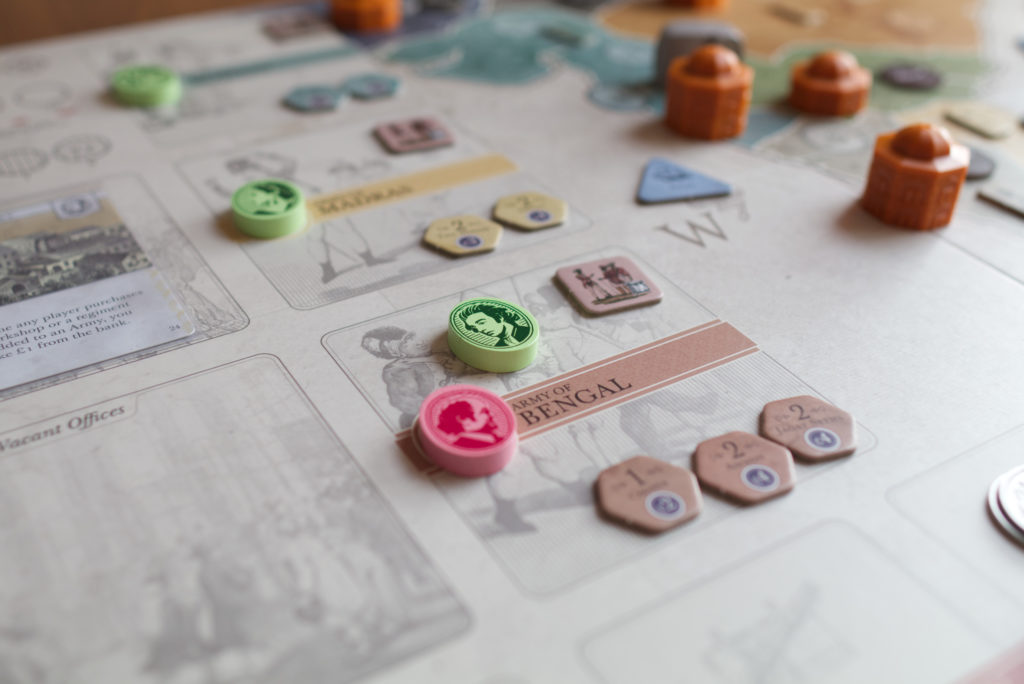
So maybe I rather go into the military. I get loot (=personal income), but I won’t be able to hire local support unless there is money in the presidency and the President actually allows me to spend it. I however need lots of troops because their number decides how many dice I get to role against the opposing forces on the board. The higher the tower in the region I attack, the more dice are removed from my role. And in a similar fate to the other offices, there is a good chance I get removed from my position.
Let’s just say it’s a tricky business to make any money – both for oneself and the company – and go on to the rest of the round.
The Turn (continued)
If you’ve got shipyards or workshops, you can get a small income from them. Then the company needs to pay expenses based on the debt it has, the number of troops it holds and then number of ships it currently uses. If the company cannot pay this substantial sum, it has to take emergency loans, the company’s standing will drop and if it drops too far, the company has failed. Game over. This revenue phase is also where the Chairman can pay dividends if there is still money left after expenses.
Then a number of events happen in India. This over time removes ships from the board and changes the map state. There is often warring between two regions and it is up to chance if it will hit one the company is in or other factions fight between each other. It happens in a very abstract way. Simply count the level of towers or company troops, see who has more and we have a winner. However, there can be empires on the map (indicated by metal flags stuck to the top of the towers) which rise and fall, invasions, revolts. A lot is left to the imagination of the players, but India feels alive somehow. The admin overhead is also pleasantly little for the results it produces. Mostly, trading routes will be closed and the company has to reopen them again. But it can also mean a devastating blow against a presidency if it is caught with its trousers down after fighting a different battle itself.
Finally, parliament meets (which is comical and dreadful beyond any brief summary I could give) and finally there is upkeep. Upkeep is mostly used to clean up the board from some temporary effects, but remember the retirees one has sent off to those fancy homes? Each player has to pay upkeep for them and if you are out of money because that one venture you had planned on didn’t succeed, they are kicked out and the player loses a lot of VP.
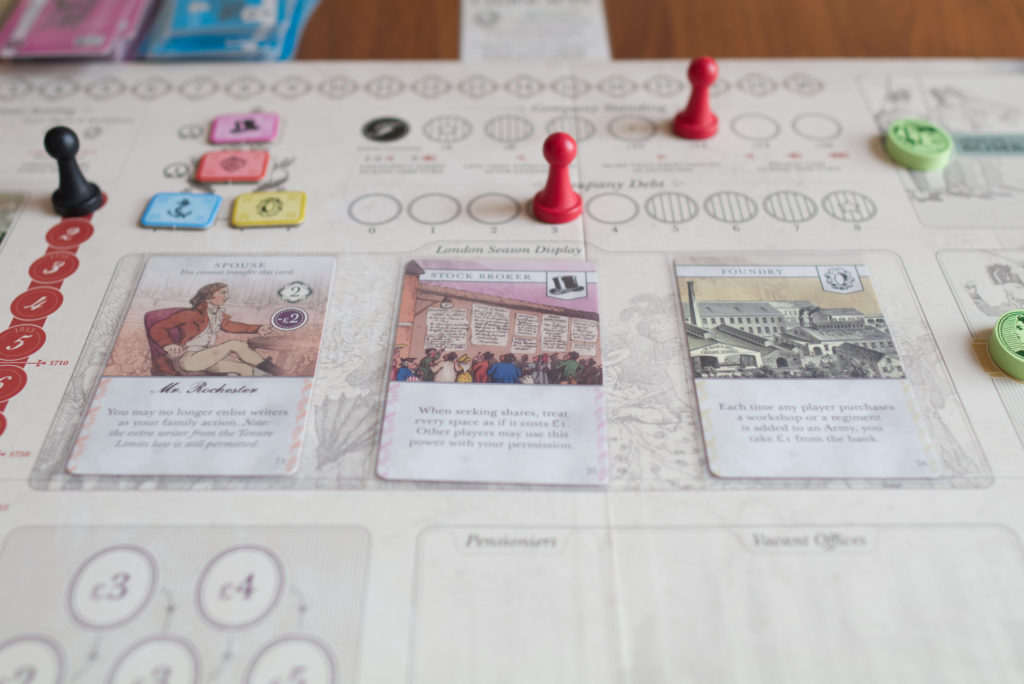
Game End
The game can end in one of two ways: either the preset number of rounds is over and the company still flourishes. In that case, each share one has in the company is worth a point which can be a lot as scores are often barely double digits. Whoever has the most VP is the winner.
If however at any point during the game the company standing goes to zero (usually because emergency loans had to be taken to cover expenses), the company has gone bust. Game ends immediately and each share actually costs 1 VP! As if that wouldn’t be bad enough, a random card is drawn from a special failure deck to indicate who the public thinks is responsible for the failure. This can change everything as suddenly the public blames the military or pardons shipyard owners. It’s a) really funny and b) prevents players from calculating too much on ruining the company on purpose.
Regardless of which end it all took, it is checked who has the most power (symbols printed on some cards and awarded to some purchases like shipyards) and that player gets some additional VP.
Solo Mode
JC2E has a dedicate solo mode in which one player plays against the Crown (sort of acting as two players in one) or 2 players can work against each other and the Crown. There is an automa priority deck and a completely separate Crown’s handbook that acts as a lookup sheet for all decisions a player would have to make. That sounds worse than it is! In practice it works quite well and fast despite the fact that there is so much in there that I still fail to memorise any of it. The general idea is that the Crown has a “mood”, one of five abstract states. When it comes to any decision (where to deploy troops, when to fulfil trade orders), one opens up the corresponding page in the handbook, checks the column for the current mood and then has the simple answer what to do. For example, when it comes to the Chairman, the Crown will distribute money to the various offices differently depending on its mood (e.g. more for ships, more for fighting). Or it will have a different number of dice it will require to even attempt a trade.
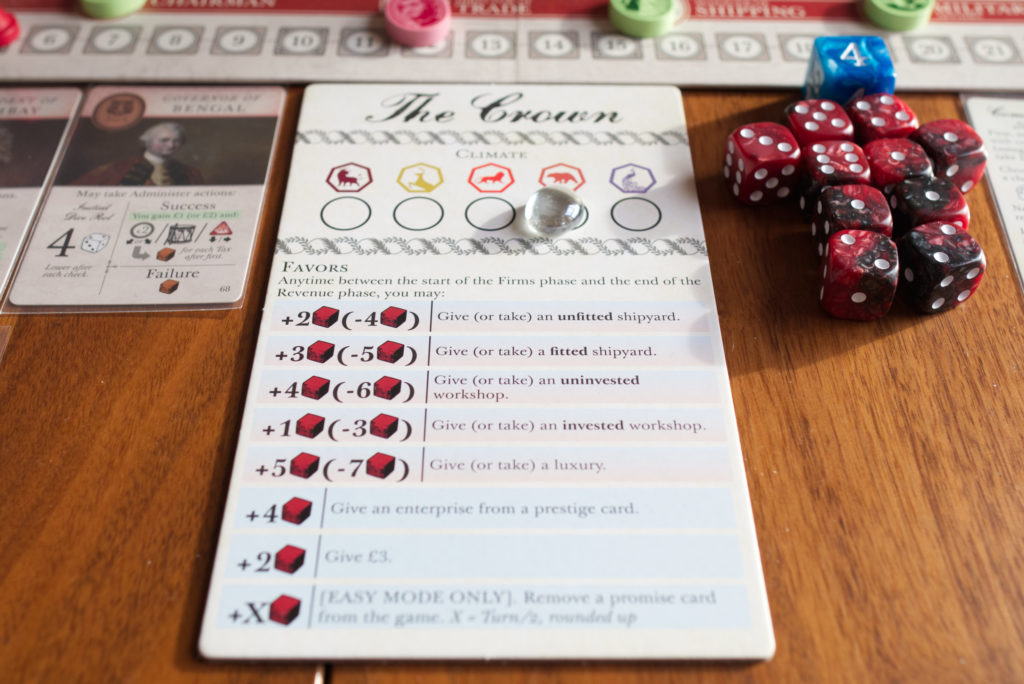
At first I was very suspicious of this as having a separate book seemed daunting. However, in practice it works surprisingly well and I enjoy seeming what the Crown does. There is however the danger of easily overlooking something. For example, there are two points in the round where the Crown adjusts its mood and it happened to me a number of times that I had just checked for the answer I was looking for and overlooked that I had do something else as well.
One tricky thing about JC2E is how to capture all that player negotiation? The solo mode does this with 12 cubes, half of which the player will get at the beginning of the game. If one does something that is beneficial for the Crown, one may get a cube. If the player wants the Crown to do ANYTHING (like allocating a ship into a specific area, assigning money, deploying in the right region), the player has to give up one or multiple cubes to the crown. It’s not the same as haggling with human players, but I would say it’s the next best thing. Brilliant idea, well done!
Metal Coins
The Kickstarter of JC2E offered an optional add-on for metal coins which I am happy to have. They have a good thickness (although they would be perfect if they were even a bit more weighty) and the graphics on them feel very thematic. I really like the “cling” sound they make when I have to give up my hard earned personal money to pay for unexpected taxes or so. The biggest gripe I have is that the colour and size of the 5er and 10er are a little bit too close to each other. However, since I usually don’t get into situations to actually have that amount of money, it’s a non-problem for me.
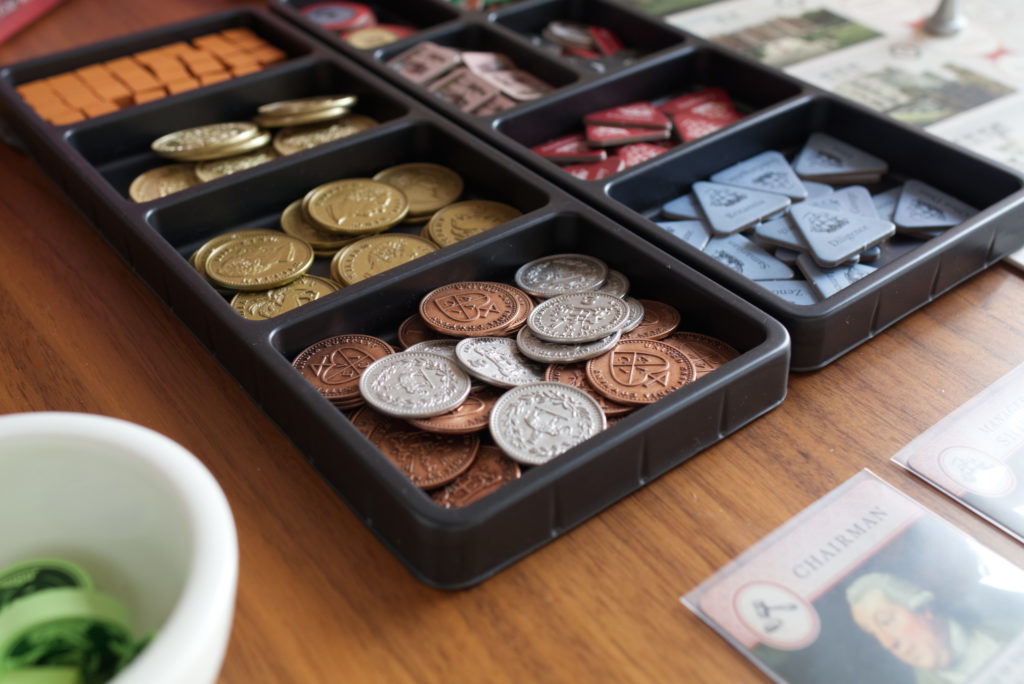
Conclusion
John Company: Second Edition is the most unexpected, fascinating gaming experience I have had since Sleeping Gods, maybe even longer. The production is great, the gameplay interesting, the solo mode works well, and it has managed to completely get me obsessed with finding out more about its setting. That’s a tall order for any game, especially one about such a tragic topic. During my first play, I was wondering if there shouldn’t be more negative effects of fighting. For example, if one attacks a region and fails, nothing happens, not even an unrest token is placed on the map. The biggest penalty is that you’ve failed to open up that region for trade which might ruin the company. The more I play JC2E, the more I really like this bird’s-eye, strategic perspective on the whole situation. It underlines the absurdity and cruelty of what is happening without shoving it in your face. Sort of like a Hitchcock movie, it’s what cannot be seen that is the most frightening. Family members are interchangeable, officials get cut at every occasion, laws are shaped for personal profit, revolts and invasions happen and my initial thought is “oh gosh, now the trade route is closed”. It’s the combination of being forced into the thought process of the company stakeholders and leaving so much to the imagination that really works for me.
It’s actually hard to step back from the theme and general experience to take a look at how well the mechanisms themselves do. I’m still far from having grokked them and the power of various roles seems to change depending on which scenario one plays. In 1710, one can have whole sessions where one rarely ever needs to do any fighting at all. There is no trading benefit for owning a region. As long as the routes are open, ships are way more powerful than any commander. A lot will depend on players balancing out the right pricing for supporting roles like the Manager of Shipping that do not have direct income. That isn’t a flaw of the game but something that will happen automatically. It’s just a different lever to be pulled, but still a powerful lever. One thing I’m curious about is if there is ever a situation in the first 1-2 rounds where it doesn’t make sense to take out the maximum 3 loans the Chairman can do without majority approval. I can imagine some, but my guess is that if I want the company to succeed, it is almost a necessity.
There is an interesting balance to be struck: in my first few plays, the company always went belly up quickly because I tried to optimise for personal gain too much. And I forgot that 1710 gives the players a law that basically is a get out of jail card to one time prevent the company from going bust. There is a lot going on in John Company: Second Edition and there is a reason why the rules have 48 pages! While the rules are well structured and in most parts good to follow, there are subtle nuances that are easy to miss. For example, a Commander can deploy into the presidency’s home region, an associated region (e.g. one that has been conquered before) or a region next to an associated region. Since the definition of “associated” easily goes under in the large volume of rules, intuitively it read like I could either deploy in my presidency’s home region or any adjacent one. But the reality is no, one first has to conquer the home region of the presidency.
So it took me a while to learn this game. Reading the rules, reading the additional solo texts, watching Heavy Cardboard playthroughs, reading up in the forum. If you can, try getting an introduction to JC2E from someone who has already played it, otherwise you might get lost. Now that I’m many plays in, JC2E feels surprisingly easy and smooth to play. A lot of the phases are like automatisms: do this, pick this one thing, roll this, done, next. Playtime really comes from the decisions that need be making, or in the case of solo, finding the right page, checking I haven’t overlooked anything.
Speaking of solo, I really like the experience. It feels part strategic game and part random-event-simulation where I’m curious to see what calamities will happen to me this time. Will this huge empire rise up and make it difficult for me to do any trade or will peace rule over India? Does the Crown get the better of me or can I persuade it (using the cubes) enough? Just as an example: in one game, I had managed to get control of the Chairman and the Presidency of Bengal. Trade routes were open and I persuaded the crown to send a lot of ships to the Eastern coast. Everything was lined up for an epic trade, I even invested so much money that I had 8 dice to role, what could go wrong? Well, my lowest die was a 4! The company earned no money this round, I earned no money that round, I had invested all I had into shares at the beginning of the round and in addition an unforeseen tax on shares hit me. The result: I lost about 12+ points in the final round because all my retirees had to leave their houses and I had to give up my shares in the company because I couldn’t pay the sudden tax. It was glorious.
Which brings me to my main point: I don’t think there are really winners and losers in this game. You have to heavily invest to be competitive but that robs you of any backup if disaster strikes. Sure, if I would have known what fate awaited me, I would have tried to do less investing at the beginning of the round. However, if the result would have been any different, I would have had not invested enough. And yes, good players will win more often than less good ones, there is a tremendous amount of skill to this game, but one needs to be okay with the fact that a single randomised outcome – much as in real life – can outweigh multiple rounds of perfect execution. My point is I don’t really care if I win or not. JC2E is such a pleasure because it is the pleasure of seeing how things play out. I’ll try my best, I’ll try to be cunning, and if the company fails and the wrong failure card comes up, so what. It will have been another session worth telling about. JC2E manages to give the players their own story to tell without denying the story that history tells us.
I could go on and on about JC2E. How everything changes when the Director of Trade is replaced by the Governor General. How individual laws can have a serious impact. How there are whole mechanism I haven’t even talked about. And that’s probably one of my favourite characteristics in games ever: if a game can capture your imagination and your thoughts long after having played it, leaving you longing for the next time to get it to the table. John Company: Second Edition is one of those rare game.
Update November 6, 2022: Since a number of people mentioned Pax Pamir: Second Edition, I borrowed a friend’s copy and played it a couple of times solo to refreshen my memory. In comparison, I find Pax Pamir way easier to learn. It took only two plays to figure out all the small rules details I missed in the first pass and after that it was easy going. After playing it multiple times back to back, I finally manage to see the meta game but still don’t enjoy Pax Pamir nearly as much, both mechanically and thematically. For my taste, the theme doesn’t shine through enough, probably because I always forget to read flavour texts on cards (something that ruined Nemo’s War (Second Edition) for me as well). John Company has the big advantage of having India and the events as an independent actor to spice up the emerging narrative. All players have to react to the same effects they cannot influence where in Pax Pamir everything is a result of what another player did. The table talk and bargaining also comes way more naturally in JC, even for players that are not used to that kind of game. For solo play, I find The Crown to be a more interesting opponent than Wakan. Everything combined, JC feels like an epic movie I’m playing a part in, which I really like. It gets to the table again and again because I want to see how the story turns out this time. Maybe that’s it: if you prefer a mostly non-random head to head competition, power play and like card engines, pick Pax Pamir. If you like bargaining/politics, economics, emerging narrative and a shared experience with a substantial dose of randomness, pick John Company.
Update April 20, 2024: I was asked how JC2e has been holding up for me, especially when it comes to playing solo. The best way I can describe it is that it has secured itself a permanent place not only in my collection but also in my brain. It seems to be the one game I keep mentioning in conversations, especially with non-gamers as an example of what modern board games can do. It made me read two books on its subject, it had me 3D modelling minis for replacing all sort of cardboard counters and ships (never quite finished that project but always plan to), but first and foremost it put me in the headspace of people doing despicable things without being explicitly judging. It’s this moment when you play the game and inadvertently think “of course I have to send my army in here and remove this obstacle, otherwise I won’t be able to buy myself that fancy house” and realise in reality that action caused the death and suffering of countless people. That moment really hits hard.
However, I don’t get JC2e to the table that often, maybe once every 2-3 months. Even writing about it makes me think I should play it more often. In part this is due to me always enjoying to explore new games (and writing about them), in part due to its substantial play length and the difficulty to find a group of friends that want to play it with me. I’ve got one friend that is interested to play JC2e more regularly, put we found the automa to be too much of a burden in a 2p setup. What works well for solo feels like an interlude when another person is involved, it breaks the flow of the experience. When it comes to solo on the other hand, I don’t mind processing The Crown at all. It’s rather that I still marvel how in the world Ricky Royal managed to craft an automa for a game that’s all about negotiations. JC2e is a great game to just see how things play out. The event mechanism gives live to the map and always interesting situations arise. The main downside and reason why I don’t play it more often solo is that the company – to me – feels doomed from the start and that cuts off a big part of the decision tree. It’s just too easy to run the company in the ground if you want to and rather hard to be in a situation where you want the company to survive (e.g. having more shares than The Crown). The solo mode adds a penalty if you run the company into the ground, but it doesn’t seem enough to really change my rational. Still, I always enjoy it greatly when I get JC2e back to the table, it might even be among my favourite games to play solo. I think of it less than a game I win or lose though, more like an infinite story generator on a rainy day when I have a couple of hours to spend indoors with a large couple of tea.
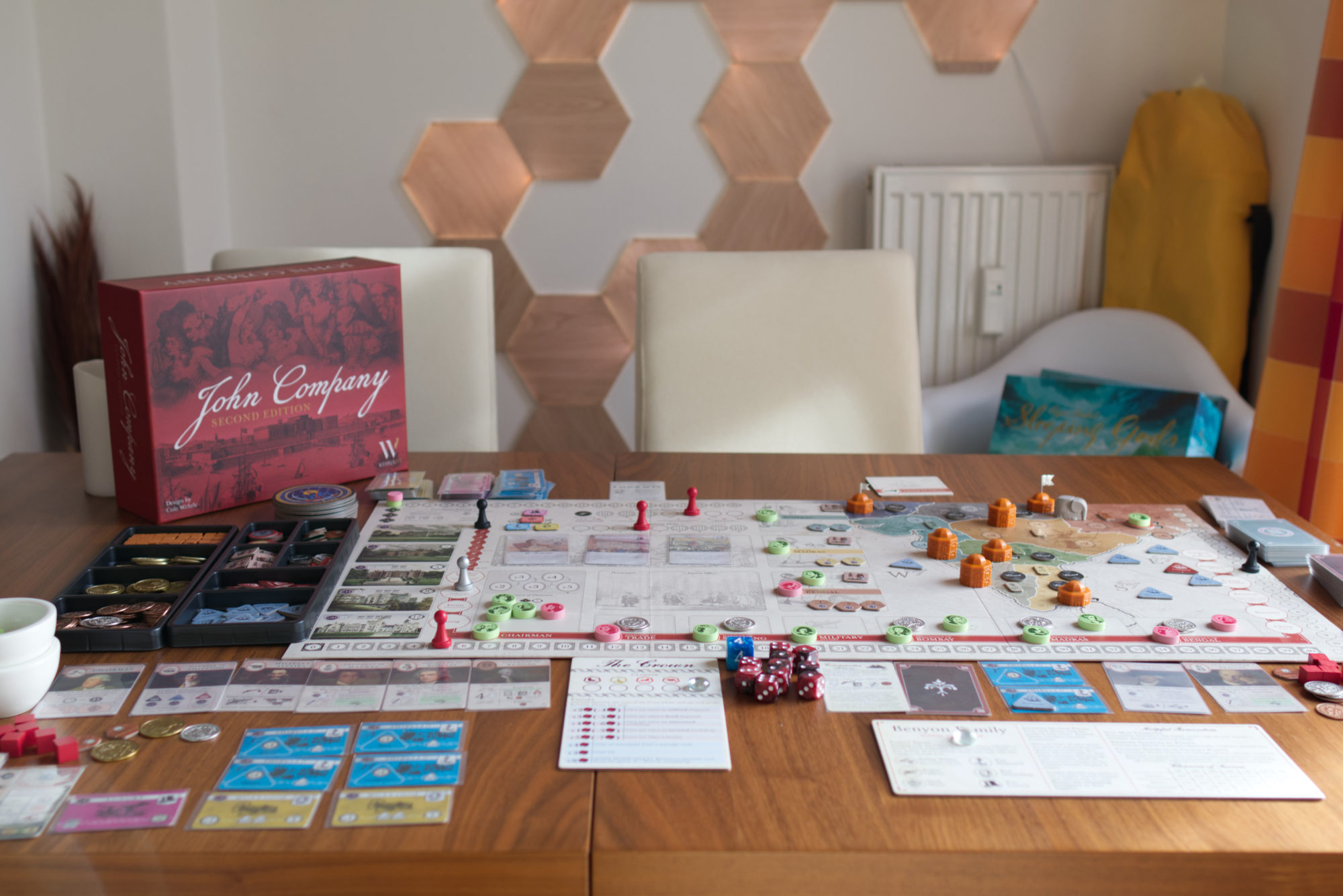
Really a great review of the game, but I’m always interested in how games keep playing over time. Is this a game you found yourself returning to from time to time. Did you find the solo mode holds up over time (I’m interested in it only for solo). Thanks!
Thanks for the kind feedback and interesting question! I’ve added an update to the original text as I thought others might also be interested and it’s easier to read than in the comment section. TLDR: very well. I don’t play it that often but it’s among my favourite solo experiences. Note though the word experience, not game. Mechanically, for my taste, it is too easy to ruin the company and win that way. It always feels a bit like I’m cheating and taking the emergency exit because otherwise I would have had no chance. Hope that helps!
Thanks. Very helpful. Still can’t decide to pull the trigger on the game. I don’t mind a good game that I return to here and there, but it is a bit costly. It seems to hit the spot of the economic game I’m looking for. PP2E also seems interesting for different reasons, but less so.
PP2E to me feels much less substantial when playing solo, almost more like a filler game. Like I don’t get much of a sense of achievement when I have won or any memorable moments. Definitely prefer it to play PP2E with 3-4 players.
Economic and solo is tricky. The solo mode of Carnegie is brilliant, but it doesn’t feel like an economy game to me. Even JC2E is more about negotiation and making compromises than pure economy. I enjoy Indonesia solo with the automa I created because it creates this sense of “I built this”, but that is even more expansive than JC2E.
Thanks again. I’ll check into Carnegie, which I passed on when it was on Kickstarter.
So one last question since you mentioned Carnegie: is the base game enough or is there something in the KS package, that’s now pretty expensive, worth it content-wise. I do like the storage in the KS version. Thx again
Tricky to answer. For me, it was worth it because I like the game so much, but it was mainly for the storage and having all the options. I have never really used the variable start setup block and rarely use the new departments, but the alternative donations are good. However, the retail edition is totally fine. Unless you know it’s one of your favourite games, I would say go retail. Here in Germany, I sometimes see the KS for like 80-100€ which I would say is a fair price. Anything above that I would likely not pay. Also I know that the expansion gameplay content can now be bought separately at least in German and English. So if you’re concerned about game play, you might as well go retail and then later seek out the expansion.